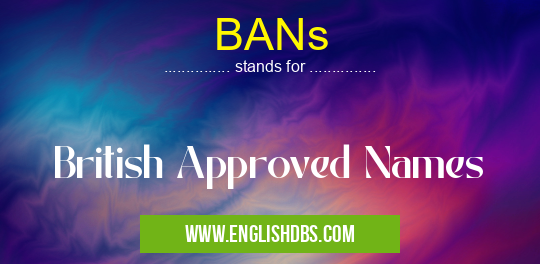What does BANS mean in BRITISH
British Approved Names (BANs) are standardized, non-proprietary names for pharmaceutical substances used in the United Kingdom (UK). They aim to provide a unique and consistent way to identify these substances, regardless of their brand name or manufacturer.

BANs meaning in British in Regional
BANs mostly used in an acronym British in Category Regional that means British Approved Names
Shorthand: BANs,
Full Form: British Approved Names
For more information of "British Approved Names", see the section below.
Essential Questions and Answers on British Approved Names in "REGIONAL»BRITISH"
What are British Approved Names (BANs)?
Who is responsible for assigning BANs?
The British Pharmacopoeia Commission (BPC) is responsible for assigning BANs. The BPC is an independent body that sets standards for medicines and medical devices in the UK.
How are BANs chosen?
BANs are chosen to be descriptive of the substance's chemical structure or pharmacological properties. They are typically short, easy to pronounce, and non-proprietary.
Why are BANs important?
BANs are important for several reasons:
- They allow healthcare professionals to communicate clearly about medications, regardless of their brand name.
- They help prevent medication errors by ensuring that the correct substance is prescribed and dispensed.
- They facilitate research and development of new medications by providing a common reference point.
Are BANs used internationally?
BANs are primarily used in the UK. However, they are also recognized and used by several other countries, including Ireland, Canada, and Australia.
